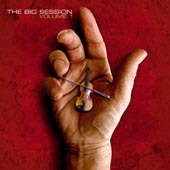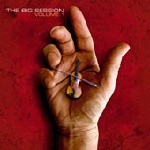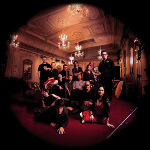- country:United Kingdom
- style(s):Folk, Rock
- label:Westpark Music
- artist posted by:Westpark Music
Links
with Eliza Carthy, The Handsome Family, Ben Ivitsky, Jim Moray, James O'Grady, Show of Hands and June Tabor
"The Big Session - Volume I" -2004 (CD 87105)
One day, after performing thousands of concerts for audiences and playing in scores of sessions just to entertain themselves and friends (in the pub, in the kitchen, backstage ...), Oysterband had a simple but actually quite subversive idea: take the informal, all-pitch-in spirit of the session, put it on the big stage - and see what happens.
Oysters were used to performing with guests in the conventional way, but this would be different. Everyone would pick what they wanted to sing and play, and if you know it you join in. (And to hell with the production polish.) Hence: the Big Session - a fresh attitude to performance? They hoped so.
Sure after a couple of try-out (but increasingly confident) tours that this could work on record too, they hired a small London venue, Bush Hall, for three days and nights earlier this year, organised an audience, parked a mobile studio on the street outside, and got down to work.
To the cream of younger British folk/roots artists from the last Big Session tour (Eliza, Ben, Jim, James) they added some friends of longer standing, Steve Knightley and Phil Beer (Show of Hands) and June Tabor; and then to throw something unpredictable into the mix, recruited the original-to-the-point-of-eccentricity American gothic of Brett and Rennie Sparks (The Handsome Family).
The Handsome Family are usually classified as stars of alt.country; what they have in common with everyone else on this project, though, is a root in the rich dark earth of traditional music and story, and THE BIG SESSION shows the strangeness and diversity of the flowers you can grow from that. The recording process was complex: arrangements evolved all day then changed again at night during the shows; voices and instruments came and went; people found themselves making music with people they had long respected but perhaps never met. It was scary but exhilarating. One song suggested another, hence some intriguing contrasts (or head-on collisions) - two songs about the wildwood, two about apocalypse, two wildly different visions of country life, a whole crowd of happy and unhappy lovers ...
The net result is a recording of rare presence and of passionate and hair-raisingly committed singing. Some of it’s dark, some of it’s fiercely joyous. It’s not at all what you’d do given modern studio resources; despite (or because of) which, it’s rivetting. Maybe this is what happens when gifted musicians allow themselves to be forced to be simple.




